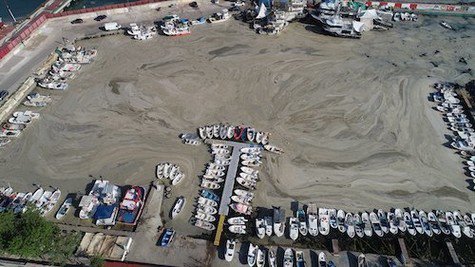Sea snot has been observed in various parts of the Sea of Marmara, Turkey's inland sea, and some streams flowing into it since early May.
 Also called marine mucilage, sea snot is a thick, mucus-like organic substance that is observed both on the surface and at the bottom of the sea that separates Turkey's Asian and European lands.
Also called marine mucilage, sea snot is a thick, mucus-like organic substance that is observed both on the surface and at the bottom of the sea that separates Turkey's Asian and European lands.
The two underlying causes of the phenomenon are the organic pollution in the sea and the sea temperature, according to a new report by the İstanbul Branch of the Chamber of Environmental Engineers
The organic pollution is caused by human wastes and the lack of sanitation, it said.
While mucilage is a natural phenomenon that can be seen seasonally, it has emerged for a much longer period and with great intensity this year, said the chamber. The formation of mucilage begins with an overwhelming increase in microscopic marine algae species.

"The pollution / organic load in the Sea of Marmara has increased significantly due to wrong wastewater treatment policies," says the chamber report. "In addition, due to the global climate crisis, there is a negative increase in the Sea of Marmara's water temperature, which will prolong the optimum conditions for mucilage."
According to the report, almost 70 percent of Istanbul's wastewater is only pre-treated and discharged into the deep sea. However, the wastewater that is thought to be transferred to the Black Sea by the undercurrent of the Marmara causes great pollution at the bottom of the Sea of Marmara.
Along with İstanbul, the wastewater of Tekirdağ, Yalova, İzmit and partly Çanakkale also "invites sea snot," the report notes.
Advanced biological treatment
The engineers said in the report that all of the wastewater discharged into the Marmara Sea should be urgently treated with advanced biological treatment.
If the pollution combined with climate change factors continues, oxygen deficiency will increase and fish migration and all kinds of biodiversity will decrease in the Sea of Marmara, said the engineers.

